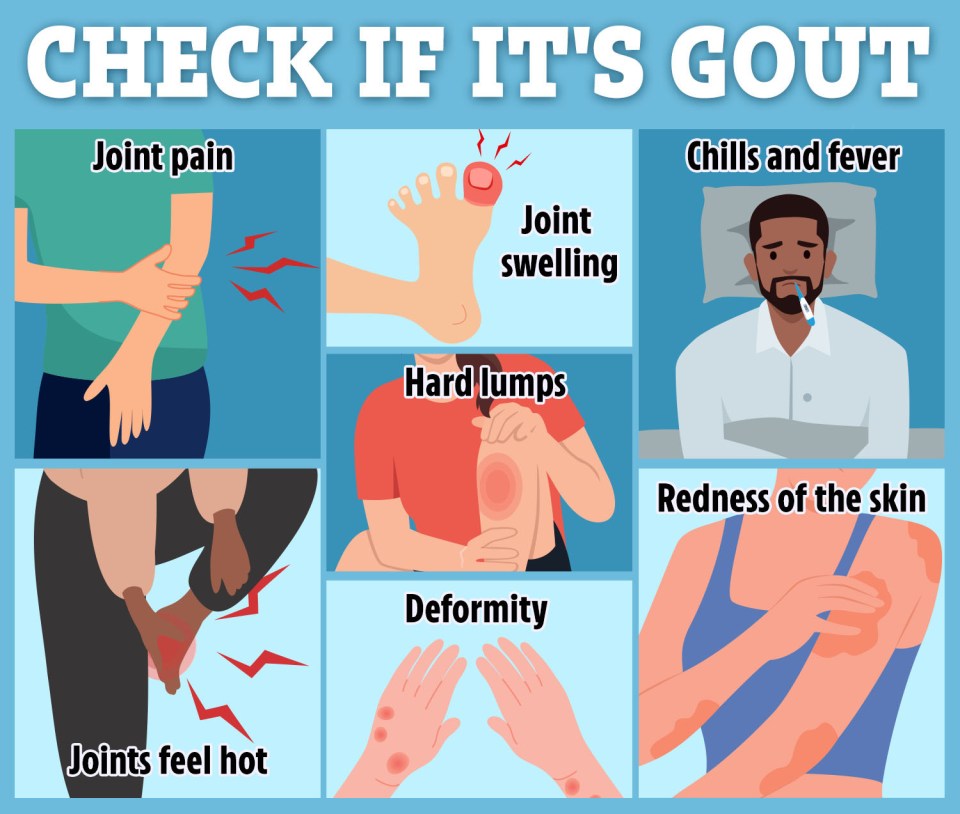FOR centuries, gout has been a deeply misunderstood disease, associated only with jolly, indulgent, and often big men.
When Henry VIII was diagnosed, it became firmly entrenched in popular belief as ‘the disease of kings.’
The truth is, anyone can get gout: man or woman, rich or poor, young or old, greedy or sober.
It is estimated that between one and two people in every 100 in the UK are affected by gout.
One of these is English actor James Corden, who has recently opened up about suffering from the agonising ailment.
When Newfoundland Diagnostics asked if he had ever considered he might have gout, the Gavin and Stacey star responded, “Oh yeah, I’ve definitely had gout before.”
The arthritic condition is caused by excess uric acid in the blood, which can form tiny needle-like crystals that inflame joints, leading to severe pain and swelling.
“Rapid weight loss and cutting out alcohol suddenly can actually trigger gout attacks,” warns Dr Hilary Jones, tells Sun Health.
“This happens because rapid weight loss breaks down cells in the body, releasing uric acid into the bloodstream,” the TV medic added.
The 46-year-old actor shed an impressive six stone in 2022, after weighing 21 stone at his heaviest.
More recently, the comedian revealed he had used controversial weight loss drug Ozempic, to move the pounds.
And while gout is on the rise in the UK and beyond, the good news is that it is eminently treatable and, in most cases, completely curable.
As many Brits also turn to drastic measures, like dry January, to shed festive weight, Dr Hilary urges caution.
While cutting out booze can help prevent gout, crash diets and suddenly cutting out alcohol might have the opposite effect.
“Focus on gradual, sustainable changes rather than quick fixes or fad diets.
“A balanced diet and regular physical activity are key to reducing your risk of gout while supporting overall health.”
According to the NHS, if you fear you have gout, you should see a GP straight away.
Symptoms of the disease include:
- Severe pain in any joint (usually the big toe, fingers, wrists, elbows or knees).
- Red, hot or swollen skin over the affected joint. “Gout does not cause lasting damage to joints if you get treatment straight away” says the NHS.
- Warmth in the joint area
- Chills and fever
- Deformities
- Hard lumps, called tophi, under your skin (can be painful)
Routine blood tests will usually identify excess levels of uric acid, which will alert doctors to the need for treatment.
But most people won’t know they have gout until they suffer a sudden, painful flare-up.
A recent study found that one in six sufferers of gout will experience another flare-up within 12 months.
This can be prevented by taking daily doses of urate lowering therapy drugs, of which allopurinol the most common (it is available under several brand names including Zyloric and Uricto).
Alongside this, lifestyle changes are necessary.
The UK Gout Society advises cutting down on foods rich in purine (the substance that creates uric acid in the blood when broken down by the body).
These include liver, anchovies, mackerel, dried beans and peas and yeast-rich drinks and foods, particularly beer.
The lesser known symptoms of gout
While gout is commonly associated with joint pain and swelling, there are several lesser-known symptoms that may not immediately be linked to the condition
Dr Hilary Jones shares the signs to watch out for:
Thick nails: Chronic gout can cause changes in the nails of the affected fingers or toes due to tophi – deposits of uric acid crystals under the skin. These deposits can result in discolored or thickened nails as they build up.
Erectile Dysfunction (ED): Men with gout are at a higher risk of developing erectile dysfunction, with studies suggesting they may experience more severe cases. This is thought to be related to the systemic inflammation and vascular problems associated with gout.
Pain at nightime: Gout attacks often occur at night, causing sharp, intense pain that disrupts sleep. Even outside of flare-ups, some individuals experience ongoing joint discomfort or sensitivity that worsens during the night.
Itchy or peeling skin around the joint: After a severe flare-up, the skin over the affected joint may peel or flake, often accompanied by itchiness. This happens as inflammation subsides and the body works to repair the damaged skin.
Chronic fatigue: Though primarily a joint condition, gout can leave sufferers feeling unusually tired or drained. Many report low energy or a general sense of malaise before or during an attack, further impacting their daily activities.
“Instead, focus on a diet that limits purine-rich foods such as red meat, shellfish, and asparagus. Instead, prioritise vegetables, fruits, whole grains, and low-fat dairy, which are less likely to trigger flare-ups,” Dr Hilary said.
Drinking plenty of water helps flush uric acid from your body, reducing the risk of crystal formation in your joints.
“Aim for at least 8–10 glasses of water daily,” the doctor said.
If you find yourself in the grip of an agonising attack, the most important thing is to treat the affected joint with a great deal of tender loving care.
The UK Gout Society suggests resting the joint in an elevated position.
And while regular exercise is advisable once the flare-up has subsided, it is never, ever a good idea to try to run on a gouty foot.
